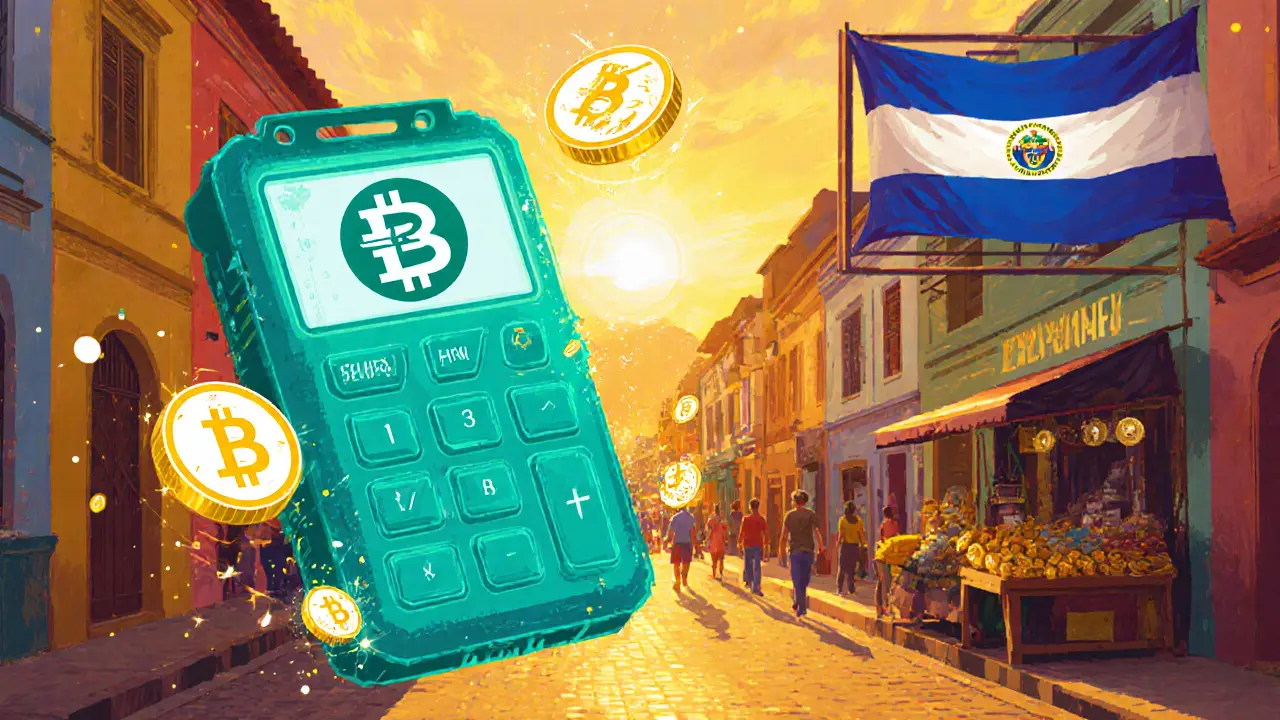El Salvador Bitcoin Tax Calculator
Tax Savings Calculator
Estimate your potential tax savings on Bitcoin gains in El Salvador. Enter your Bitcoin holdings and sale amount below.
Estimated Tax Savings
Your potential tax savings in El Salvador would be:
Total Taxable Gain:
Local Tax Liability:
El Salvador Tax Exemption:
Potential Savings:
When the world first heard that a tiny Central American nation had made Bitcoin legal tender and eliminated capital gains tax on its transactions, most assumed it was a publicity stunt. In reality, ElSalvador has built a complete tax‑free framework for Bitcoin that still matters for investors in 2025. This guide walks you through the core rules, who can benefit, how the regulatory body works, what the latest IMF concessions mean, and how the country stacks up against other crypto‑friendly jurisdictions.
TL;DR - Quick Takeaways
- ElSalvador’s Digital Assets law imposes zero capital gains tax on Bitcoin for both locals and foreign investors.
- Investors holding at least 3BTC in the country qualify for a full exemption on any Bitcoin profit.
- The National Commission of Digital Assets (CNAD) issues two licenses: Bitcoin Service Provider (BSP) and Digital Asset Service Provider (DASP).
- IMF‑mandated changes in 2024‑2025 trimmed government Bitcoin purchases but left the capital‑gains exemption untouched.
- Compared with the Cayman Islands, UAE, Germany and Portugal, ElSalvador is the only country that treats Bitcoin itself as a tax‑free legal tender.
1. The Core Policy: Zero Capital Gains Tax on Bitcoin
ElSalvador’s Digital Assets Law, enacted in September2021, declares Bitcoin a legal tender and explicitly states that any profit arising from Bitcoin sales or exchanges is not subject to capital gains tax. The law’s language reads:
‘Gains derived from the acquisition and disposition of Bitcoin shall be exempt from income‑tax and capital‑gains‑tax provisions.’
This exemption applies to all residents and to foreign investors who meet a modest threshold - owning at least three Bitcoin while being registered with CNAD.
2. Who Can Benefit? Eligibility & Investor Incentives
Eligibility splits into two buckets:
- Domestic holders: Any Salvadoran who buys, sells or uses Bitcoin in daily transactions pays no tax on the profit.
- Foreign investors: To qualify, an investor must (a) register with CNAD, (b) hold a minimum of₿3 in a licensed wallet, and (c) report the holdings annually. Once qualified, all Bitcoin‑related gains-whether realized in ElSalvador or abroad-remain tax‑free.
Beyond the tax break, the government offers additional perks under the LEAD (Legal Entities for the Advancement of Development) program: corporate income tax, services transfer tax and municipal taxes are waived for licensed crypto businesses.
3. The Regulatory Engine: CNAD and Licensing
The National Commission of Digital Assets (CNAD) serves as the single point of oversight. It issues two distinct license types:
- Bitcoin Service Provider (BSP) license: For entities that only handle Bitcoin - payment processors, custodial or non‑custodial wallets, and Bitcoin‑only exchanges.
- Digital Asset Service Provider (DASP) license: For businesses dealing with other cryptocurrencies, NFTs, token issuances, or broader investment services.
Both license categories require:
- Robust AML/KYC policies aligned with FATF recommendations.
- Quarterly activity reports submitted to CNAD and the Ministry of Finance.
- Annual audited financial statements, even though the core tax on Bitcoin gains is zero.

4. IMF‑Driven Adjustments: What Changed in 2024‑2025?
In December2024, the government secured a $1.4billion loan from the International Monetary Fund (IMF). The IMF demanded several policy shifts to unlock the funds:
- Reduced state‑direct Bitcoin purchases to a capped 5% of the annual fiscal budget.
- Eliminated the mandatory acceptance rule for merchants - no longer forced to accept Bitcoin.
- Ended the option to pay taxes in Bitcoin, restoring the traditional cash‑only model for tax remittance.
- Started winding down the state‑run Chivo wallet, though the platform still operates for private users.
Crucially, the capital‑gains exemption survived the amendment passed in February2025. Analysts interpret this as the government’s effort to keep the most attractive feature - the tax haven - while appeasing international lenders.
5. How ElSalvador Stands Against Other Crypto‑Friendly Jurisdictions
Only a handful of countries offer any form of crypto tax relief in 2025. The table below highlights the main differences.
| Country | Tax Scope | Key Requirement | Regulatory Body |
|---|---|---|---|
| ElSalvador | Zero capital gains tax on Bitcoin only | Hold ≥₿3, register with CNAD | CNAD |
| Cayman Islands | No income, capital gains, or corporate tax on any crypto | Establish a local entity | Financial Services Authority |
| UAE (Dubai, AbuDhabi) | Zero tax on all crypto activity | Obtain a Virtual Asset Service Provider (VASP) license | Dubai Financial Services Authority |
| Germany | Zero tax after 12‑month holding period | Hold assets ≥12months | BaFin |
| Portugal | Zero tax on long‑term crypto gains, extra NHR benefits for expats | Become tax resident, hold >12months | Portuguese Tax Authority |
ElSalvador’s model is unique because it singles out Bitcoin as a tax‑free legal tender, whereas the other jurisdictions apply broader or asset‑type‑agnostic rules.
6. Practical Steps for Businesses Wanting to Operate Tax‑Free
If you run a crypto‑related startup or a traditional firm looking to accept Bitcoin, here’s a checklist that satisfies CNAD’s requirements while taking advantage of the tax exemption:
- Determine licensing path: If you only deal with Bitcoin, apply for a BSP; otherwise, go for a DASP.
- Prepare documentation: Incorporation papers, AML/KYC policies, proof of capital (for foreign investors, proof of ≥₿3), and a detailed business plan.
- Submit application through CNAD’s online portal. Expect a 60‑day review period.
- Set up accounting: Even though Bitcoin gains are tax‑free, you must keep transaction logs, wallet addresses, and audit‑ready ledgers.
- File annual reports to both CNAD and the Ministry of Finance, noting that capital gains are exempt under Article12 of the Digital Assets Law.
- Stay compliant: Monitor any IMF‑driven regulatory updates - the core exemption is stable, but reporting formats may evolve.
7. Risks, Criticisms, and What to Watch
While the tax break is attractive, investors should keep an eye on three potential pitfalls:
- Political volatility: Changes in presidency or future IMF negotiations could modify the legal tender status.
- Adoption slump: Survey data from the Universidad Centroamericana José Simeón Cañas shows Bitcoin usage dropping from 25.7% in 2021 to just 8.1% in 2024. Low domestic demand may affect liquidity.
- International perception: Some foreign banks remain hesitant to transact with Salvadoran crypto firms, which could increase compliance costs.
Mitigation strategies include diversifying holdings across multiple jurisdictions, keeping a reserve of fiat for operational costs, and maintaining transparent AML/KYC practices to ease correspondent banking relationships.
8. Bottom Line - Is ElSalvador Still a Viable Crypto Tax Haven?
Yes, but with nuance. The zero capital gains tax on Bitcoin remains intact, making the country a rare haven for pure‑Bitcoin strategies. However, investors must navigate a smaller domestic market, potential policy drift, and the need for strict licensing. Pairing ElSalvador’s exemption with a secondary residence in a broader‑tax‑free jurisdiction (like the Cayman Islands) can provide a hedge against future regulatory shocks.

Frequently Asked Questions
Does the zero capital gains tax apply to other cryptocurrencies?
No. The exemption is limited to Bitcoin. Other digital assets are subject to the standard income‑tax regime unless the government later amends the law.
What happens if I sell Bitcoin while traveling outside ElSalvador?
If you are registered with CNAD and hold the required ₿3, the gain remains tax‑free regardless of where the sale occurs. You still need to report the transaction to CNAD for compliance.
Can a foreign company set up a subsidiary in ElSalvador to avoid taxes?
Yes, provided the subsidiary obtains a BSP or DASP licence and complies with AML/KYC reporting. The subsidiary will enjoy the same zero‑tax treatment on Bitcoin gains, but any non‑Bitcoin income will be taxed under regular corporate rules.
Is the IMF agreement likely to revoke the tax exemption?
So far, the IMF has only demanded changes to Bitcoin purchases and tax‑payment mechanisms, not the capital‑gains exemption. While future negotiations could revisit the clause, current legislation protects the exemption until a formal amendment is passed.
How do I prove I hold ₿3 for tax‑free status?
Submit a blockchain‑verified snapshot of your wallet address, signed by a CNAD‑approved auditor, along with a personal identification document. The snapshot must be dated within the reporting year.







Jacob Anderson
August 6, 2025 AT 03:07Zero capital‑gains tax on Bitcoin? Sure, because the best way to attract serious investors is to turn whole‑hearted fiscal policy into a circus act. Just make sure the government doesn't pull the rug before the next IMF audit.
Kate Nicholls
August 8, 2025 AT 10:41While the exemption looks shiny on paper, the real catch is the three‑Bitcoin holding requirement and the mandatory CNAD registration, which can be a bureaucratic maze for newcomers. Still, for those who can clear the hurdle, the tax‑free upside is hard to ignore.
Richard Herman
August 10, 2025 AT 18:14From a cultural standpoint, El Salvador’s move signals a bold embrace of digital sovereignty, positioning the nation as a testbed for crypto‑centric economies. If the regulatory framework remains transparent, it could inspire other developing economies to experiment without fear of immediate tax penalties.
Parker Dixon
August 13, 2025 AT 01:47👍 If you’re eyeing the tax savings, first lock down at least ₿3 in a CNAD‑approved wallet, then file the annual snapshot to stay compliant.
Make sure your AML/KYC policies are rock‑solid – the commission does not look kindly on slackers.
Even though the gains are tax‑free, you still need proper bookkeeping; a simple spreadsheet can save you headaches later.
And don’t forget to keep an eye on IMF news; policy tweaks tend to surface after quarterly reviews. 🚀
Stefano Benny
August 15, 2025 AT 09:21From a risk‑adjusted perspective, the nominal “zero‑tax” label obscures underlying exposure to geopolitical volatility, exchange‑rate drift, and potential retroactive legislation.
Bobby Ferew
August 17, 2025 AT 16:54Oh, delightful – another jurisdiction promising tax nirvana while the rest of the world tightens its fiscal noose.
celester Johnson
August 20, 2025 AT 00:27“Tax exemption without profit” reads like a Zen koan, inviting us to ponder whether freedom lies in the ledger or the law.
Prince Chaudhary
August 22, 2025 AT 08:01Stay focused on compliance – the paperwork is the price of freedom in a tax‑free zone.
Mark Camden
August 24, 2025 AT 15:34According to Article 12 of the Digital Assets Law, any capital gain derived from Bitcoin transactions is expressly exempt from income‑tax, provided the holder satisfies the three‑Bitcoin threshold and registers with the CNAD.
Evie View
August 26, 2025 AT 23:07The IMF may have pruned the state’s Bitcoin purchases, but it left the capital‑gains loophole untouched, proving that even multilateral lenders respect a well‑crafted tax sanctuary.
Kate Roberge
August 29, 2025 AT 06:41Honestly, if you’re looking for a place to hide crypto profits, you might be better off in the Cayman Islands – they won’t ask you to hold three whole Bitcoins.
Oreoluwa Towoju
August 31, 2025 AT 14:14Keep records of your wallet snapshots; the CNAD will ask for them during annual compliance checks.
Amie Wilensky
September 2, 2025 AT 21:47Indeed, the exemption-while alluring-carries obligations: proof of holding ≥₿3, registration with CNAD, and submission of a blockchain‑verified snapshot; neglecting any of these, however, could jeopardize the tax‑free status, thus rendering the touted benefit moot.
Moreover, investors should remain vigilant, monitoring IMF conditionalities, domestic legislative amendments, and global regulatory trends, because a single policy shift-no matter how minor-may cascade into substantive fiscal repercussions.
Michael Wilkinson
September 5, 2025 AT 05:21The political volatility in San Salvador means tomorrow’s tax haven could become today’s cautionary tale if a new administration decides to roll back the Bitcoin law.
Clint Barnett
September 7, 2025 AT 12:54Picture a small Central American nation that decided to turn Bitcoin into legal tender and then slapped a zero‑tax label on any profit, as if that alone would fast‑track it into the pantheon of financial innovators.
The first thing any savvy investor notices is the three‑Bitcoin minimum, a threshold that simultaneously filters out hobbyists and signals a commitment to scale.
Next comes the CNAD registration, a process that feels part bureaucracy, part rite of passage, demanding AML/KYC protocols that would make a Wall Street compliance officer blush.
While the tax exemption is crystal‑clear in the wording of Article 12, the practical reality is that you must still maintain meticulous ledgers, because the commission audits quarterly.
If you ignore the quarterly reports, you risk administrative fines that-ironically-could eclipse the very tax you were trying to avoid.
The IMF’s involvement introduced a subtle but vital nuance: although the state’s direct Bitcoin purchases are capped, the capital‑gains exemption survived untouched.
That survival tells a story about the government’s strategic calculus: keep the most tantalizing incentive while appeasing international lenders.
Crypto‑centric entrepreneurs should also weigh the domestic adoption curve, which, according to recent university surveys, has slipped from a quarter of the population to under ten percent.
A dwindling user base can impair liquidity, making it harder to convert large positions without moving the market.
On the other hand, the regulatory clarity-especially the bifurcated licensing regime of BSP and DASP-offers a roadmap for businesses willing to navigate the paperwork.
A BSP license suffices for pure‑Bitcoin operations, while a DASP opens doors to the broader token ecosystem, albeit with a heavier compliance burden.
From a tax planning perspective, pairing an El Salvador entity with a subsidiary in a jurisdiction like the Cayman Islands can create a robust buffer against any future policy shock.
Such a dual‑structure allows you to enjoy the zero‑tax benefit on Bitcoin in El Salvador while preserving corporate flexibility elsewhere.
Nevertheless, no strategy is immune to the specter of political upheaval; a shift in presidential priorities could rewrite the legal tender law overnight.
Therefore, continuous monitoring of legislative updates, IMF dialogues, and domestic political sentiment is not just advisable-it’s essential.
In short, the El Salvador tax haven is a high‑reward, high‑complexity proposition that rewards diligent compliance as much as it rewards bold speculation.
Carl Robertson
September 9, 2025 AT 20:27Wow, that was a roller‑coaster of legalese and optimism – I felt like I was reading a Netflix thriller about fiscal policy.
You’ve managed to turn tax code into a battlefield, and I’m here for the drama.
Rajini N
September 12, 2025 AT 04:01If you’re still deciding, start by opening a CNAD‑approved wallet, capture a snapshot of the address holding ₿3, and then file the audit report via their portal; this simple checklist smooths out most of the early friction.
Sidharth Praveen
September 14, 2025 AT 11:34The future could see more nations adopting similar crypto‑friendly frameworks, turning today’s niche tax haven into a mainstream financial toolkit.
Staying ahead of the curve now positions you to reap the long‑term benefits as the global regulatory landscape evolves.
Sophie Sturdevant
September 16, 2025 AT 19:07Keep that positive momentum; remember to diversify across assets and jurisdictions, and treat compliance as part of your growth strategy, not a side‑quest.
Nathan Blades
September 19, 2025 AT 02:41In the grand theater of sovereign finance, tax exemptions are the spotlight, but the true actors are the people who dare to rewrite the rules of value.
El Salvador may have turned Bitcoin into a stage, yet the audience-investors, regulators, and citizens alike-determines whether the show endures or fades to black.